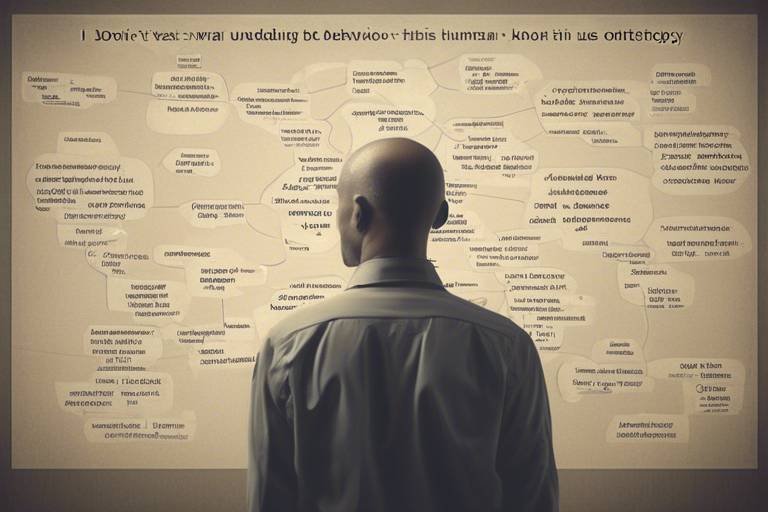How Can Metaphysics Influence Our Perception of Reality?
Have you ever stopped to wonder how our understanding of reality is shaped? It’s a fascinating inquiry that dives deep into the realms of metaphysics, which is essentially the study of what exists beyond the physical world. In our daily lives, we often take our perceptions for granted, but the truth is that these perceptions are influenced by complex philosophical concepts that define our existence. Metaphysics invites us to question everything—from the nature of consciousness to the very fabric of the universe. By exploring these intricate relationships, we can gain a clearer understanding of how metaphysical theories mold our beliefs and interpretations of reality.
At its core, metaphysics serves as the backbone of philosophical inquiry, addressing fundamental questions about existence, reality, and the nature of being. It’s like the foundation of a house; without it, everything else would crumble. Understanding these foundations is crucial for exploring their influence on our perception of reality. For instance, when we consider concepts like substance, causality, and modality, we begin to see how they play a significant role in shaping our everyday experiences. Imagine trying to build a puzzle without knowing what the picture looks like; that’s what navigating reality is like without a grasp of metaphysical principles.
One of the most pivotal distinctions in metaphysics is between essence and existence. Essence refers to the intrinsic nature of something—what makes it what it is—while existence pertains to the fact that it is, in reality. This dichotomy influences our perception of what it means to be. For example, consider a chair: its essence might be defined by its function and design, while its existence is the physical object sitting in your living room. This distinction can radically alter how we interpret our surroundings and interact with the world.
Additionally, language plays a crucial role in shaping our thoughts and perceptions. It’s not just a means of communication; it’s a vital tool in metaphysics. The way we articulate our thoughts can influence our understanding of reality. For instance, the way we describe emotions can change our perception of them. If we label something as “sad,” we may experience it differently than if we describe it as “melancholic.” This brings us to the debate between metaphysical realism and anti-realism, which raises questions about the nature of reality itself. Are we perceiving an objective reality, or is our understanding merely a subjective interpretation shaped by our experiences and language?
Time and space are also central themes in metaphysics. Different interpretations of these concepts can drastically shape our perception of reality. For instance, consider the idea that time is linear, moving from past to future, versus the notion that time is cyclical, repeating itself endlessly. These contrasting views can lead to entirely different experiences of life. If we see time as a straight line, we might feel pressure to achieve certain milestones. On the other hand, if we perceive it as cyclical, we may embrace a more relaxed attitude towards life’s events.
The relationship between metaphysics and consciousness is another profound area of inquiry. How do metaphysical theories about the mind influence our understanding of consciousness and subjective experience? This question leads us to the classic mind-body problem, which questions the relationship between mental and physical states. Different philosophical perspectives—dualism, materialism, and idealism—offer various answers, each impacting how we perceive our reality. For instance, if you believe in dualism, you might see consciousness as separate from the physical body, leading to a different understanding of personal identity and existence.
Lastly, let’s not forget the role of intuition in metaphysical thought. Intuitive insights often shape our understanding of reality, influencing philosophical discourse on existence and perception. Think of intuition as your internal compass—it guides you through the complex landscape of existence, helping you make sense of the world around you. It’s that gut feeling you get when something doesn’t seem right, or the sudden clarity you experience when pondering a deep question. This intuitive understanding can often lead to profound realizations about the nature of reality and our place within it.
- What is metaphysics? Metaphysics is a branch of philosophy that explores the fundamental nature of reality, including concepts like existence, being, and the universe.
- How does metaphysics influence our perception? Metaphysical concepts shape our beliefs and interpretations of reality, affecting how we experience existence and consciousness.
- What is the mind-body problem? The mind-body problem questions the relationship between mental states and physical states, exploring how they interact and influence our perception of reality.
- Why is language important in metaphysics? Language shapes our thoughts and perceptions, influencing how we articulate and understand complex metaphysical concepts.

The Foundations of Metaphysics
Metaphysics, at its core, serves as the backbone of philosophical inquiry, addressing the fundamental questions that have puzzled humanity for centuries. What does it mean to exist? What is the nature of reality? These questions, though seemingly simple, plunge us into a deep sea of philosophical exploration. Understanding the foundations of metaphysics is crucial for anyone seeking to grasp how these philosophical concepts shape our perceptions and beliefs about existence, consciousness, and the universe.
To appreciate the depth of metaphysics, we can think of it as a vast tapestry woven from various threads of thought. Each thread represents a different philosophical inquiry, and together they create a complex picture of reality. The essence of metaphysics lies in its ability to challenge our perceptions and push the boundaries of our understanding. It invites us to question not just what we see, but how we interpret those experiences. This exploration can lead to surprising revelations about the world around us.
One of the key aspects of metaphysics is its focus on the nature of being. The distinction between what is 'real' and what is merely 'perceived' often leads to a fascinating discourse. For instance, consider the concept of substance, which refers to what things are made of. Is the essence of a chair merely its physical components, or does it encompass something more, like its purpose or function? This inquiry into substance leads us to ponder the nature of reality itself and how our understanding of it shapes our experiences.
Moreover, metaphysics delves into the principle of causality, which examines the relationships between events and their causes. This concept is pivotal in shaping our understanding of how the world operates. For example, if we see a glass shatter on the floor, we instinctively seek to understand the cause—was it a force applied, or was it simply a result of gravity? Our perceptions are influenced by our understanding of these causal relationships, highlighting the intricate dance between metaphysical concepts and our everyday experiences.
Another important aspect of metaphysics is modality, which deals with possibility and necessity. This concept encourages us to think about what could be versus what must be. For instance, when imagining different scenarios or outcomes, we engage with modal thinking. This not only enriches our intellectual discourse but also influences our beliefs and decisions in real-life situations. The interplay between possibility and necessity can dramatically alter our perception of reality, making us more aware of the choices we make and their potential consequences.
Ultimately, the foundations of metaphysics provide us with a framework to explore the deeper questions of existence. They encourage us to look beyond the surface and engage with the complexities of reality, inviting us to consider how our beliefs shape our understanding of the universe. As we embark on this philosophical journey, we find that metaphysics is not just an abstract discipline; it is a vital lens through which we can examine our lives and the world around us. In the following sections, we will delve deeper into the key concepts of metaphysics and their implications for our perception of reality.
- What is metaphysics? Metaphysics is a branch of philosophy that explores the fundamental nature of reality, including concepts such as existence, objects, and their properties.
- Why is metaphysics important? It helps us understand the underlying principles of reality, which can influence our perceptions, beliefs, and experiences in life.
- How does metaphysics relate to other fields of philosophy? Metaphysics intersects with epistemology, ethics, and other philosophical disciplines, as it lays the groundwork for understanding existence and knowledge.
- Can metaphysical concepts be applied in everyday life? Yes, metaphysical concepts can influence our decision-making, beliefs about the world, and how we interpret our experiences.

Metaphysics is a fascinating realm of philosophy that delves deep into the fundamental nature of reality. It’s like peeling back the layers of an onion, revealing the core truths that shape our existence. Among the myriad of concepts that metaphysics explores, three key ideas stand out: substance, causality, and modality. Each of these concepts plays a crucial role in how we perceive and interpret the world around us.
Substance refers to what something is fundamentally made of. Think of it as the building blocks of reality. In metaphysical terms, it can be physical (like matter) or abstract (like ideas or properties). This concept raises intriguing questions: What is the essence of a tree? Is it merely its physical form, or does its essence include its role in the ecosystem? Understanding substance helps us grasp the very fabric of existence and how different entities relate to one another.
Causality is another cornerstone of metaphysical thought. It pertains to the relationship between cause and effect. Imagine throwing a stone into a pond; the stone creates ripples that spread outward. This simple act illustrates how one event can lead to another. In metaphysics, causality prompts us to consider deeper implications: Are our actions truly free, or are they predetermined by a series of prior events? This inquiry not only shapes our understanding of reality but also influences ethical considerations about responsibility and agency.
The third key concept, modality, deals with the possibilities and necessities of existence. It explores questions such as: What could be? What must be? And what cannot be? Modality encourages us to think beyond the constraints of our current reality. For instance, when we dream or imagine alternate scenarios, we engage with modal thinking. It opens the door to understanding potential realities and the limits of our perceptions. In this sense, modality acts as a bridge between the actual and the possible, urging us to consider not just what is, but what could be.
These three concepts—substance, causality, and modality—are interconnected and form the backbone of metaphysical inquiry. They shape our understanding of existence and influence how we interpret our experiences. By reflecting on these ideas, we begin to appreciate the complexity of reality and our place within it. It’s like standing on the edge of a vast ocean of thought, where every wave represents a different perspective on existence.
To further illustrate these concepts, let’s consider a simple table that outlines their definitions and implications:
| Concept | Definition | Implications |
|---|---|---|
| Substance | The fundamental nature of entities. | Shapes our understanding of existence and identity. |
| Causality | The relationship between cause and effect. | Influences our views on free will and determinism. |
| Modality | The exploration of possibilities and necessities. | Encourages creative thinking about potential realities. |
As we navigate through these metaphysical concepts, we start to see how they intertwine with our daily lives and shape our perceptions. They invite us to question our assumptions about reality and to explore the deeper meanings behind our existence. The beauty of metaphysics lies in its ability to challenge our thinking and expand our understanding of the universe.
- What is metaphysics? Metaphysics is a branch of philosophy that studies the fundamental nature of reality, including concepts like existence, objects, and their properties.
- Why are substance, causality, and modality important? These concepts help us understand the underlying principles of reality and influence our perceptions and beliefs.
- How does metaphysics relate to everyday life? Metaphysical concepts shape our understanding of existence, influencing our thoughts, beliefs, and actions in everyday situations.

The distinction between essence and existence is a pivotal theme in metaphysical discussions. It probes deep into the question of what it means to truly be. Essence refers to the fundamental nature or intrinsic characteristics of a being—what makes something what it is. On the other hand, existence pertains to the state of being present in the universe. To put it simply, essence is about the qualities that define something, while existence is about whether that something is actually there. Imagine a beautiful painting; its essence is the colors, the strokes, and the emotions it evokes, but its existence is the physical canvas hanging on the wall.
This dichotomy has profound implications for how we interpret our surroundings. For instance, consider the classic philosophical question: "Does a tree falling in the forest make a sound if no one is there to hear it?" This question invites us to ponder whether the essence of sound exists independently of our perception. If we say that sound is merely a wave phenomenon, then yes, the tree does create sound. However, if we believe that sound requires a listener to be truly 'real,' then perhaps it does not exist in that moment. This illustrates how our understanding of essence and existence can shape our perception of reality.
Philosophers like Jean-Paul Sartre have famously argued that existence precedes essence, suggesting that individuals first exist and then create their essence through actions and choices. This contrasts with the views of many classical philosophers, such as Aristotle, who believed that essence is a precondition for existence. The debate continues to influence contemporary thought, especially in discussions about identity, purpose, and the nature of reality itself.
In practical terms, this distinction can affect our daily lives. For example, when we define ourselves, are we focusing on our essence—our values, beliefs, and characteristics—or are we merely acknowledging our existence in a social context? Understanding this difference can lead to profound insights about our personal journeys and the meaning we derive from our experiences.
To summarize, the essence vs. existence debate is not just an abstract philosophical exercise; it has real implications for how we perceive and navigate the world. By grappling with these concepts, we can gain a deeper understanding of ourselves and the universe around us.
- What is the main difference between essence and existence?
Essence refers to the intrinsic qualities that define something, while existence pertains to whether that something is present in reality. - Why is the essence vs. existence debate important?
This debate influences our understanding of identity, purpose, and reality, impacting how we perceive ourselves and the world. - Can essence exist without existence?
Philosophically, this question raises complex issues, as some argue that essence can exist conceptually even if the entity itself does not exist physically.

Language is not merely a tool for communication; it is a powerful lens through which we perceive and interpret our reality. Think about it: when we describe our experiences, we are not just relaying facts; we are framing them within the constructs of language. This framing can significantly influence our understanding of existence and the world around us. For instance, the way we articulate our thoughts can shape our beliefs and perspectives, often without us even realizing it. The intricate relationship between language and thought is a fundamental aspect of metaphysical inquiry.
Consider the famous Sapir-Whorf hypothesis, which posits that the structure of a language affects its speakers' worldview. This suggests that if we lack words for certain concepts, we may struggle to comprehend them fully. For example, in cultures that have multiple words for "snow," the inhabitants may perceive and interact with snow in ways that others cannot. This highlights how language can expand or limit our reality, shaping not just our communication but our cognition itself.
Moreover, the nuances of language can lead to different interpretations of the same reality. Take the concept of time, for example. In English, we often describe time as a linear progression—past, present, and future. In contrast, some Indigenous languages perceive time as cyclical. This difference in linguistic structure can lead to fundamentally different understandings of existence. When we say, “I will see you tomorrow,” we are framing our perception of time in a specific manner that may not resonate with someone from a culture that views time differently. Thus, language not only reflects our reality but actively participates in constructing it.
Furthermore, the metaphysical implications of language extend to how we engage with abstract concepts such as love, justice, or beauty. Each of these concepts is laden with cultural significance, and the words we use to describe them can evoke a spectrum of emotions and interpretations. For instance, the word "love" can encompass a wide range of feelings and relationships, from familial to romantic. This complexity illustrates how language can enrich our understanding of reality, allowing us to explore the depths of human experience.
In essence, language serves as a bridge between our inner thoughts and the external world. It allows us to articulate our perceptions, share our insights, and connect with others. However, it also poses challenges. Miscommunication or differing interpretations can lead to misunderstandings, highlighting the limitations inherent in any linguistic framework. This interplay between language and perception underscores the importance of being mindful of the words we choose and the meanings we ascribe to them.
To summarize, the role of language in metaphysics is multifaceted and profound. It shapes our perceptions, influences our beliefs, and ultimately plays a crucial role in defining our reality. As we continue to explore the depths of metaphysical thought, we must remain acutely aware of the power of language and its ability to both illuminate and obscure our understanding of existence.
- How does language influence our perception of reality? Language shapes our thoughts and beliefs, framing our experiences and influencing how we interpret the world around us.
- What is the Sapir-Whorf hypothesis? This hypothesis suggests that the structure of a language affects its speakers' worldview, impacting their understanding of concepts and experiences.
- Can language limit our understanding of certain concepts? Yes, if a language lacks specific words for certain ideas, speakers may find it challenging to comprehend or communicate those ideas fully.
- How does language affect abstract concepts? The words we use to describe abstract concepts can evoke different emotions and interpretations, enriching our understanding of human experiences.

When diving into the depths of metaphysics, one cannot avoid the intriguing debate between metaphysical realism and anti-realism. These two opposing viewpoints offer a fascinating lens through which we can examine the nature of reality itself. But what do these terms really mean? Simply put, metaphysical realism posits that there is a reality that exists independent of our perceptions or beliefs. Imagine a world where the mountains, rivers, and stars exist whether or not anyone is there to observe them. This perspective suggests that our understanding of the universe is merely a reflection of a more profound reality that exists outside our subjective experiences.
On the flip side, we have anti-realism, which challenges this notion. Anti-realists argue that our understanding of reality is fundamentally shaped by our perceptions, experiences, and linguistic frameworks. In this view, reality is not a fixed entity waiting to be discovered; rather, it is a construct influenced by our interpretations. Think of it like a painting—while the canvas and paint exist, the meaning and experience of the artwork depend entirely on the observer's perspective. This leads to a rich tapestry of interpretations, each valid in its own right.
To further illustrate these concepts, let's consider a few key distinctions:
| Aspect | Metaphysical Realism | Anti-Realism |
|---|---|---|
| Nature of Reality | Independent of human thought | Dependent on human perception |
| Objective Truth | Exists regardless of beliefs | Constructed through social and linguistic contexts |
| Examples | Physical laws, objective facts | Social constructs, personal experiences |
This dichotomy influences not just philosophical discourse but also our everyday lives. For instance, consider how we approach scientific discoveries. A realist might argue that scientific laws describe the world as it is, while an anti-realist might contend that these laws are simply the best explanations we have based on our current understanding. This ongoing debate invites us to reflect on our beliefs and encourages a deeper inquiry into the nature of existence.
Ultimately, the clash between metaphysical realism and anti-realism invites us to ponder profound questions: What is the nature of reality? Can we ever truly know it? And how do our perceptions shape the world around us? By engaging with these questions, we not only expand our philosophical horizons but also enrich our understanding of the universe and our place within it.
- What is metaphysical realism? Metaphysical realism is the belief that reality exists independently of our perceptions or beliefs.
- What is anti-realism? Anti-realism posits that our understanding of reality is shaped by our perceptions and experiences, suggesting that reality is a construct.
- How do these concepts affect our understanding of science? Realism suggests scientific laws describe an objective reality, while anti-realism argues that these laws are merely the best explanations based on current knowledge.
- Why is this debate important? The discussion between realism and anti-realism challenges us to think critically about the nature of existence and our interpretations of reality.

When we think about time and space, it's easy to get lost in the complexity of these concepts. They are not just abstract ideas; they are the very frameworks through which we experience reality. Imagine time as a river, flowing continuously, while space is the landscape through which that river travels. This analogy helps us understand how intertwined these elements are in shaping our perception of existence.
Traditionally, metaphysics has grappled with questions like: What is time? Is it linear, cyclical, or even an illusion? Similarly, what is space? Is it merely a container for objects, or does it have properties of its own? These questions delve into the very fabric of our reality. For instance, if time is merely a construct of human perception, what does that say about our experiences and memories? Are they reliable, or are they just fleeting moments caught in the current of this metaphorical river?
To further explore the nature of time and space, we can consider two major philosophical perspectives: Newtonian physics and Einstein's theory of relativity. Newton viewed time and space as absolute entities, existing independently of the objects within them. In contrast, Einstein proposed that time and space are interconnected, forming a four-dimensional continuum known as spacetime. This shift in understanding has profound implications for how we perceive reality. If time is relative, as Einstein suggested, does that mean our experiences of it can vary dramatically based on our position and speed? This raises fascinating questions about the nature of existence itself.
Moreover, the implications of these theories extend beyond the realm of physics into our everyday lives. For instance, consider how we schedule our days. Our perception of time influences everything from our productivity to our emotional states. A minute can feel like an eternity when we are bored, yet it can vanish in an instant when we are having fun. This subjective experience of time is a testament to its complex nature.
Similarly, space shapes our interactions and relationships. The way we navigate our environments—whether it's the cozy confines of our homes or the vastness of nature—affects our mood and mental state. The concept of personal space is a clear example of how our perception of space can influence our comfort levels and social interactions. Understanding these dynamics can lead to deeper insights into how we relate to ourselves and the world around us.
In conclusion, the nature of time and space is a rich field of inquiry within metaphysics that challenges our understanding of reality. By examining these concepts, we not only gain insight into the universe but also into our own existence. As we explore further, we must ask ourselves: How do our perceptions of time and space shape our lives? How can we harness this understanding to enrich our experiences?
- What is metaphysics? Metaphysics is a branch of philosophy that explores fundamental questions about existence, reality, and the nature of being.
- How does time influence our perception of reality? Our perception of time can affect our emotions and experiences, making moments feel longer or shorter based on our activities and mental states.
- What is the difference between Newtonian physics and Einstein's theory of relativity? Newtonian physics views time and space as absolute and independent, while Einstein's theory posits that they are interconnected and relative.
- Can our perception of space affect our relationships? Yes, our understanding of personal space and how we navigate our environments can significantly impact our social interactions and emotional well-being.

The relationship between metaphysics and consciousness is a profound area of inquiry that invites us to explore the very essence of our being. At its core, metaphysics seeks to answer the fundamental questions about existence, reality, and the nature of the universe, while consciousness deals with our awareness and perception of that reality. This intricate interplay raises intriguing questions: What does it mean to be conscious? How does our awareness shape our understanding of the world around us? To unravel these mysteries, we must delve deep into various metaphysical theories that attempt to explain the nature of consciousness.
One of the most compelling aspects of this relationship is the mind-body problem, a classic metaphysical issue that questions how our mental states (thoughts, feelings, and perceptions) relate to our physical existence (the body and brain). Philosophers have debated this issue for centuries, presenting various perspectives that influence our perception of reality. For instance, dualism posits that the mind and body are distinct entities, suggesting that consciousness exists independently of the physical brain. In contrast, physicalism argues that everything about consciousness can be explained through physical processes and brain activity.
Consider this analogy: if consciousness is like a movie, then the brain acts as the projector. Dualists might argue that the film (consciousness) exists separately from the projector (brain), while physicalists would assert that the film cannot exist without the projector. This debate not only shapes our understanding of consciousness but also influences how we perceive the world. If we believe our consciousness is separate from our physical existence, we may view our experiences as more ethereal or spiritual. Conversely, if we see consciousness as a product of physical processes, we might adopt a more scientific approach to understanding our experiences.
Another vital aspect to consider is the role of intuition in metaphysical thought. Intuition often serves as a guiding force in our understanding of consciousness and reality. It allows us to grasp complex concepts that might be difficult to articulate. For example, when we feel an emotional connection with someone, we may intuitively understand that our consciousness is intertwined with theirs, even if we can't fully explain why. This intuitive insight can lead us to explore deeper metaphysical questions about the interconnectedness of all beings and the nature of existence itself.
In summary, the relationship between metaphysics and consciousness is not merely an academic pursuit; it's a journey into the depths of what it means to be human. By exploring various metaphysical theories and engaging with the mind-body problem, we can gain a richer understanding of our consciousness and how it shapes our perception of reality. As we ponder these profound questions, we might find that our awareness expands, leading us to new insights about ourselves and the universe.
- What is the mind-body problem?
The mind-body problem explores the relationship between mental states and physical states, questioning how consciousness relates to the physical brain. - How does intuition influence our understanding of consciousness?
Intuition helps us grasp complex metaphysical concepts about consciousness, often guiding our insights and understanding of reality. - What are the implications of metaphysical theories on our perception of reality?
Different metaphysical theories shape how we interpret our experiences, influencing our beliefs about existence and consciousness.

The mind-body problem is one of the most fascinating and complex issues in metaphysics, raising profound questions about the relationship between our mental states and the physical world. At its core, this dilemma asks: how can something as intangible as thought and consciousness arise from something as tangible as the brain? It's like trying to understand how a beautiful melody can emerge from a simple collection of notes. This relationship is not just a philosophical curiosity; it has real implications for how we perceive our own existence and the world around us.
To grasp the depth of the mind-body problem, we must first explore the two primary perspectives that dominate this debate: dualism and physicalism. Dualism, famously championed by René Descartes, posits that the mind and body are fundamentally different substances. Descartes famously stated, "I think, therefore I am," suggesting that our very existence is rooted in our capacity to think, separate from our physical form. On the other hand, physicalism argues that everything about the mind can be explained through physical processes and interactions within the brain. In this view, consciousness is merely an epiphenomenon of neural activity, akin to the steam that rises from a boiling kettle—an output of physical processes but not a substance in itself.
Each perspective offers unique insights and challenges. For instance, dualism raises the question of how these two distinct substances interact. If the mind is non-physical, how can it influence the body? This leads to the so-called interaction problem, where the mechanics of such communication remain elusive. Conversely, physicalism faces the challenge of explaining subjective experiences—those rich, personal feelings and thoughts that seem to transcend mere biological processes. How can the firing of neurons give rise to the rich tapestry of human experience, from the joy of a sunset to the ache of heartbreak?
Moreover, the implications of these theories extend beyond mere academic debate. They influence our understanding of personal identity, ethical considerations, and even the nature of reality itself. For instance, if our consciousness is merely a product of physical processes, does that diminish our sense of self? Are we simply biological machines, or is there something more profound that defines our existence? This is where the mind-body problem becomes not just a philosophical inquiry but a deeply personal one, inviting us to reflect on our own experiences and beliefs.
Interestingly, contemporary discussions often incorporate insights from neuroscience and psychology, bridging the gap between metaphysics and empirical science. Researchers are beginning to explore how brain activity correlates with mental states, providing a more nuanced understanding of the mind-body relationship. This intersection of disciplines is akin to a dance, where philosophy and science collaborate to shed light on the mysteries of consciousness.
In summary, the mind-body problem is a rich and multifaceted issue that challenges our understanding of existence. Whether viewed through the lens of dualism or physicalism, it compels us to confront fundamental questions about who we are and how we relate to the world. As we continue to explore this intricate relationship, we may find that the answers lie not in rigid categories but in the fluid interplay between mind and body, thought and action, existence and essence.
- What is the mind-body problem? The mind-body problem explores the relationship between our mental states and physical processes, questioning how consciousness arises from the brain.
- What are the main perspectives on this issue? The two primary perspectives are dualism, which posits that the mind and body are separate, and physicalism, which argues that everything about the mind can be explained through physical processes.
- Why is the mind-body problem important? This problem influences our understanding of personal identity, ethics, and the nature of reality, making it a deeply significant philosophical inquiry.

Intuition is often described as that gut feeling or inner voice that guides our decisions, sometimes even before we can articulate the reasons behind them. In the realm of metaphysics, intuition serves as a bridge between our conscious thoughts and the deeper, often elusive truths about existence and reality. It’s like having a compass that points us toward understanding, even when the path is foggy. Have you ever had a moment where you just *knew* something was right or wrong, despite the lack of concrete evidence? That’s your intuition at work, and it plays a pivotal role in shaping our perception of reality.
Philosophers have long debated the significance of intuition in understanding metaphysical concepts. For instance, consider the distinction between abstract reasoning and intuitive insight. While abstract reasoning relies heavily on logic and structured thought, intuition often bypasses these processes, leading to immediate understanding. This can be particularly powerful when grappling with complex metaphysical questions about existence, consciousness, and the universe. Intuition can help us grasp ideas that might otherwise seem too abstract or convoluted.
Moreover, intuition can act as a catalyst for philosophical inquiry. When we experience a strong intuitive response to a metaphysical concept, it often prompts us to explore that concept further. This exploration can lead to profound insights and revelations. For example, the intuitive understanding of interconnectedness in the universe might inspire someone to delve into theories of quantum mechanics or holistic philosophies. In this way, intuition not only influences our perceptions but also drives the quest for deeper knowledge.
However, relying solely on intuition can be a double-edged sword. While it can lead to genuine insights, it can also mislead us if we don’t balance it with critical thinking and empirical evidence. It’s essential to recognize the limitations of intuition, especially in a field as intricate as metaphysics. Just as a compass can point you in the right direction, it can also lead you astray if you’re not aware of your surroundings. Therefore, the key is to cultivate a harmonious relationship between intuition and rational thought.
In metaphysical discourse, intuition can manifest in various forms, such as:
- Visceral Understanding: The immediate grasp of a concept without the need for analytical breakdown.
- Creative Insights: New ideas or connections that arise spontaneously, often leading to innovative philosophical theories.
- Emotional Resonance: A feeling that certain metaphysical ideas resonate with our personal experiences, shaping our beliefs and perceptions.
Ultimately, the role of intuition in metaphysics is akin to a dance between the known and the unknown. It invites us to explore the mysteries of existence while reminding us to remain grounded in our experiences. By embracing both intuition and reason, we can enrich our understanding of reality and foster a more profound connection with the world around us. So, the next time you feel that intuitive nudge, take a moment to listen—it might just lead you to new realms of understanding.
Q1: What is intuition in the context of metaphysics?
A1: Intuition in metaphysics refers to the immediate understanding or insight about philosophical concepts that often bypasses logical reasoning.
Q2: Can intuition lead to accurate metaphysical insights?
A2: Yes, intuition can provide valuable insights, but it should be balanced with critical thinking and empirical evidence to ensure accuracy.
Q3: How can I develop my intuitive abilities?
A3: Practices such as mindfulness, meditation, and reflective journaling can help enhance your intuitive skills and deepen your understanding of metaphysical concepts.
Frequently Asked Questions
- What is metaphysics?
Metaphysics is a branch of philosophy that explores the fundamental nature of reality, existence, and the universe. It delves into questions about what things are, why they exist, and how they relate to one another. Think of it as the philosophical framework that helps us understand the 'why' behind everything we perceive.
- How does metaphysics influence our perception of reality?
Metaphysics shapes our understanding of reality by providing a lens through which we interpret our experiences. For instance, the concepts of substance and causality help us make sense of the world around us, guiding our beliefs and assumptions about existence and consciousness.
- What is the difference between essence and existence?
Essence refers to the fundamental properties or characteristics that make something what it is, while existence pertains to whether something is present or real. This distinction is crucial in metaphysics, as it influences how we perceive identity and reality itself.
- Why is language important in metaphysics?
Language plays a pivotal role in shaping our thoughts and perceptions. It serves as the medium through which we express and communicate metaphysical ideas. The way we use language can influence our understanding of complex concepts, impacting our perception of reality.
- What is metaphysical realism?
Metaphysical realism is the view that the world exists independently of our perceptions or beliefs about it. In contrast, anti-realism suggests that our understanding of reality is shaped by our experiences and interpretations. This debate significantly affects how we perceive and relate to the world around us.
- How do time and space relate to metaphysics?
Time and space are central themes in metaphysical inquiry. Different interpretations of these concepts can alter our perception of reality, influencing how we experience events and understand our existence within the universe.
- What is the mind-body problem?
The mind-body problem explores the relationship between mental states (like thoughts and feelings) and physical states (like the brain and body). This classic metaphysical issue raises questions about how consciousness arises and how it interacts with the physical world, impacting our perception of reality.
- How does intuition play a role in metaphysical thought?
Intuition is often considered a guiding force in metaphysical exploration. It allows individuals to grasp complex concepts and insights that might not be immediately apparent through logical reasoning alone. This intuitive understanding can shape our beliefs and perceptions about existence and reality.



















